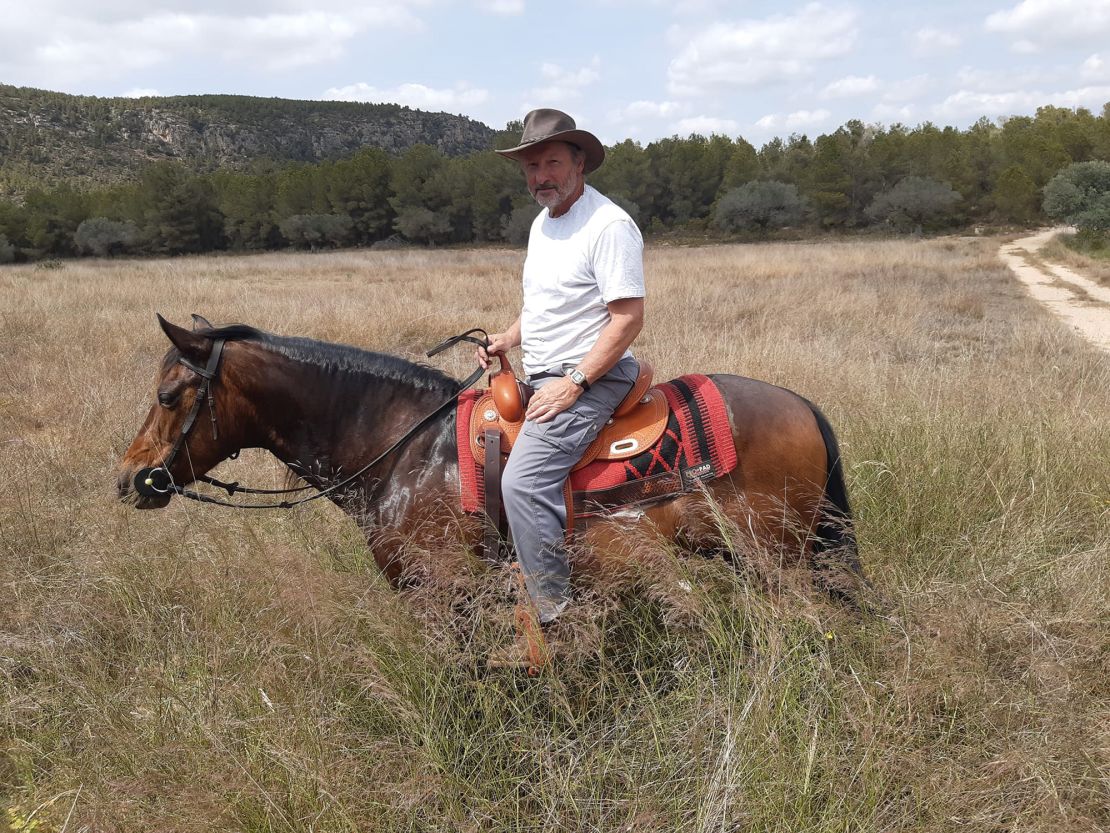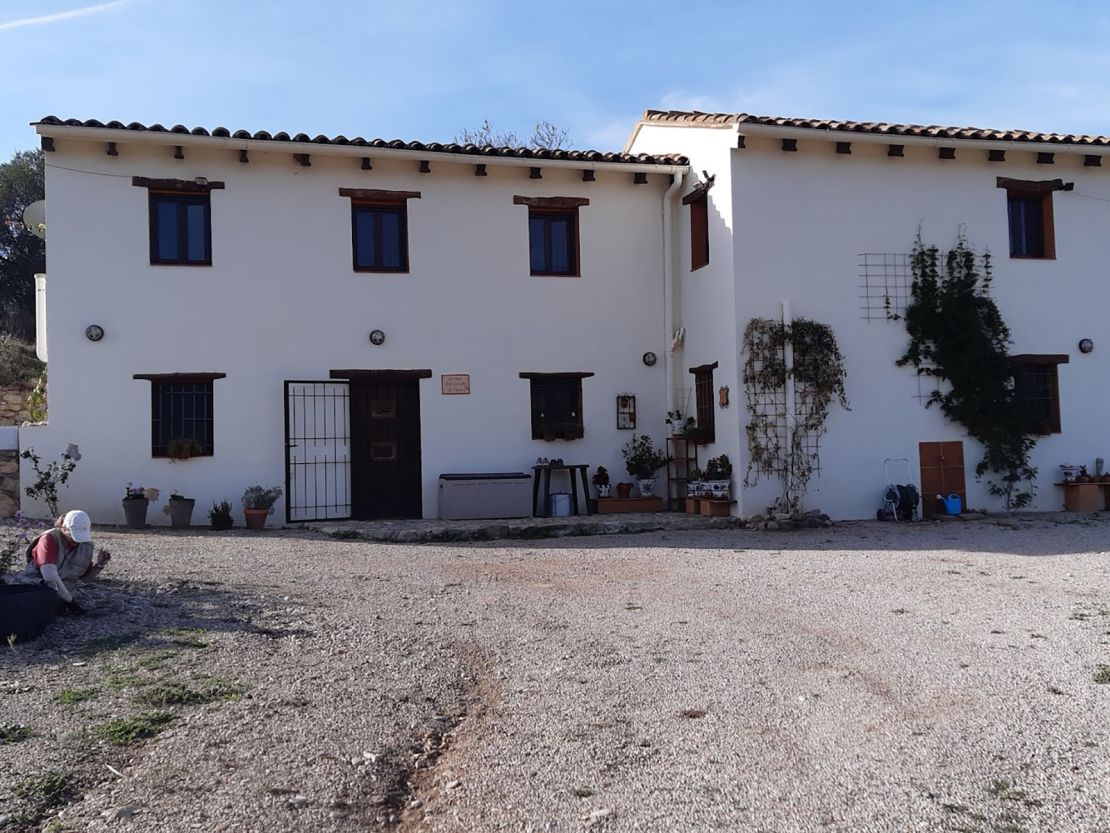For Regina and John Zdravich, the Italian dream began more than 20 years ago, after a friendship with a young Italian exchange student they were hosting got them thinking about the future.
The couple from Northwest Indiana had no way of knowing at the time it would send them on an intercontinental odyssey that would encompass frustration, homelessness and finally happiness in an unexpected destination.
It was back in 2001 when they formed a close bond with their young lodger, going on to visit her in Italy three times, during which they “fell in love” with the country and began to think about what life would be like if they moved there.
“Then we had another foreign exchange student from Germany,” John tells CNN Travel.
“And we started thinking, ‘Well, maybe we would do this, because we kept going back to visit them in Europe.”
Something different
As they got closer to their retirement, the couple, who’ve been married since 1988, started to take the idea more seriously.
“We had lived in the US all our lives and wanted to try something different,” says Regina, who had several different jobs over the years, but was working as a bookkeeper before retiring.
They were also keen to downsize.
“Our house was too big for us,” says Regina. “And we knew we would have to move somewhere. And then we thought, ‘Let’s just go overseas.’”
The Zdravichs, who both retired at the age of 62, had gotten to know Italy well during their visits, so it was top of their list of destinations to move to.
After doing some research into the prospect, they decided to go for it, and set about selling their three-bedroom home in Northwest Indiana in 2017.
The couple then packed some of their essential belongings into a crate, shipped them over to Italy, and “started getting rid of everything we owned.”
“We started selling stuff online, as much stuff as we could sell,” says Regina. “We gave a bunch to charity. It took a long time to get rid of everything.”
According to John, they “did well” from the sale of their house and were “pretty financially comfortable” as they prepared to relocate.
The Zdravichs left the US for Italy in January 2018, with their cat Sonya in tow. But things didn’t exactly go to plan.
They moved into an apartment in Salerno, near Naples, and began the process of applying for an elective residence visa, also known as an Italian retirement visa, a long-stay permit for non-EU citizens with a specific amount of passive income who intend to take residence in Italy.
“We needed a national fiscal ID (a tax code similar to a Social Security number) and we needed a lease on an apartment proving we had a place to stay,” says Regina.
After three months, the couple returned to the US to complete the rest of the process through the Italian Consulate in Detroit, hoping they’d be able to return to the country permanently once they had their paperwork in order.
Stumbling blocks

While they provided as much documentation as they could, the Zdravichs say they found the process “an absolute nightmare,” and reached a major stumbling block when they were asked to produce their income tax returns with their retirement income.
“That wasn’t going to happen for another year,” says Regina, pointing out that she had only retired at the end of 2017.
Realizing that they were unlikely to be approved without these details, the disheartened couple chose to withdraw their application, and asked for their passports to be sent back to them.
“Then we thought, ‘What the hell are we going to do?’” adds Regina.
At this point, the couple, who’d been staying in Airbnbs in Indiana and northern Wisconsin while they submitted their paperwork, didn’t really have anywhere to go.
“We were homeless,” says Regina. “We had no home. No car. Nothing. And it was winter in Northwest Indiana, which is snow, ice, all that kind of stuff.”
Unsure of what step to take next, they chose to return to Italy to try to figure things out.
While they were there, the Zdravichs scoured website forums for advice or information from others who’d been in similar situations and learned that some who’d struggled to gain residency in Italy had chosen to retire to Spain instead.
“We thought, ‘Okay, we can do that,’” says Regina.
As the couple had never visited Spain before, they decided to travel there to see if it was somewhere they could envision themselves living.
“We’d been back to Italy a number of times and traveled to quite a bit of the country… But Spain had never been on our radar, other than being able to point to it on the map,” admits John.
While in the country, they took a gamble and signed a year-long lease on an apartment so that they’d have a place to stay if everything worked out.
The Zdravichs then decided to return to the US once again, renting an apartment in Chicago, while they got their affairs in order.
At this stage, John, whose father is from southeast European country Serbia, began the process of obtaining Serbian citizenship, which would ultimately make a move to another European country much simpler if things were to go wrong again.
“We were kind of located near the Serbian consulate and the Spanish consulate (in the US),” says Regina. “So then we started the process with both of them.”
John’s Serbian citizenship came through after about a month, according to Regina.
The couple were granted Non-Lucrative visas (or retirement visas,) a permit that allows non-EU nationals to live in the country without working or engaging in any professional activity, for Spain, within around three months.
“It was a process that was like having a full-time job,” she adds.
Spanish move

In August 2018, around eight months after originally leaving the US for Italy, the Zdravichs arrived back in Spain to begin their new lives.
The change of location created much confusion for the couple during their first few months in the country, particularly when it came to the language.
“It was kind of disorienting, because we had been studying Italian,” says Regina. “And literally overnight, we got rid of all of our Italian books and Rosetta Stone and went out and got it in Spanish.”
Despite their disorientation, the couple threw themselves into life in Spain, basing themselves in beach town Oliva, situated in the region of Valencia.
The Zdravichs quickly found that they enjoyed the Spanish lifestyle very much.
“The Spanish like to have fun,” says John, adding that he finds Spaniards to be “a little more laid back.”
“This would be a great place to have been 40 years younger. They have their fiestas. We have fun.”
The couple, who had previously bought and renovated homes together, went on to purchase a three-bedroom home in the town of Garcia in Catalonia, northeastern Spain, with two hectares of land for 165,000 euros (around $184,000) in November 2018.
“We had horses when we lived in the US, and we knew we wanted to have horses again,” says Regina.
“So that’s why a place with land was attractive to us. And plus, we’re in sort of a nature-zone area.
“For us and what we wanted to do, it was just the perfect setting, even though it was in Catalonia, which has its own language and wants to break away from Spain.”
While the house “was in really good shape,” the Zdravichs went on to spend around 10,000 euros (about?$11,187) on renovation work, and a further 15,000 euros on a new solar power system.
“We’re actually on the River Ebro, which the Spanish might not think is that big of a deal,” says John.
“But in the United States, to be living on a major river is, even though I don’t fish anymore, it’s nice.”
One of the biggest struggles they say they’ve encountered since relocating has been learning the language, particularly now that they’re in Catalonia, which has its own language, Catalan – as well as its own parliament and flag.
The autonomous?region held a referendum for independence from Spain back in 2017.
“Sometimes we get mixed up… They speak Catalan, especially in these small towns,” says Regina. “They want to hang on to their Catalan language.
“And we need to know Spanish because all of the official stuff that we have to do is done in Spanish…
“The fact that there is a second language here, has made our progress a little bit slower I think.”
John points out that many of their friends in the country are retirees from England, which hasn’t helped matters.
“We do take language classes,” he says. “But since we don’t work, we speak English to each other (all the time).”
Another aspect of living in Spain that Regina finds difficult is the use of the metric system.
“I’m baffled,” she admits. “Recipes baffle me because I just can’t get my head wrapped around it. I’m finally getting used to the temperature.”
Affordability factor

The couple, who now have long-term residency cards, have found Spain to be much more affordable than the US, particularly when it comes to eating out.
“Sometimes it’s almost like you can’t afford not to go out to dinner,” says John. “Because it’s so affordable.
“And if you don’t like wine, you’re in the wrong place. Because wine here is excellent and it’s affordable.”
The Zdravichs are also full of praise for the country’s “amazing” public healthcare system.
They say they bought a private health insurance policy during their “first couple of years” in Spain, but were then able to register for healthcare after providing their residency documentation and health records.
Catalonia has its own public health system, which can be accessed by any of its residents.
“John had to have back surgery, we didn’t pay a penny,” says Regina. “You go and you buy a prescription, and you can use your pocket change.
“In the US, it’s just insane how expensive healthcare is. And here it just isn’t.”
According to Regina, the couple save a lot of money each year on her asthma medication, which wasn’t covered by her health insurance in the US.
However, there are some things that are more expensive in Spain.
“We pay more in income taxes in Spain than what we do in the United States,” she says. “But I feel like we get a lot for it… The roads are in perfect condition. There’s a lot of social type services if you need them.”
Although they’ve also found fuel to be more costly in Spain, the couple say that they drive shorter distances now, so this hasn’t impacted them massively.
“Going out to do things is way less expensive than what it is in the US,” says Regina. “So overall, it’s a lot cheaper to live here.
“Living in the US on the money that we have, I think it would be a little more tricky.”
The Zdravichs have only returned home a few times since relocating to Spain permanently and say that, while they miss their friends, they don’t miss living there.
“America’s pretty much gone off the deep end right now,” says John. “We watch the evening news every night, and you just sit there and you go, ‘It’s getting crazier and crazier.’”
They have no desire to return permanently, and say they keep their visits to a minimum as they find traveling long distances particularly grueling nowadays.
When reflecting on their unsuccessful attempt to obtain residency for Italy, the couple now feel that things might have turned out differently if they’d hired an immigration lawyer.
In fact, they say they’d advise anyone attempting to relocate to a new country permanently to use one, provided that they “have the money to be able to do that.”
“We did it all on our own, and it was an awful lot of work,” says Regina. “There’s a lot of documentation you’ve got to pull together… You have to be organized.”
Although they were “very, very disappointed” to have to give up on their Italian dream in 2018, the Zdravichs are now very happy in Spain and remain in touch with the former exchange student who first introduced them to the idea of living in Italy.
“We had our hearts set on Italy,” says Regina. “But in hindsight, I think it might have worked out better.”



